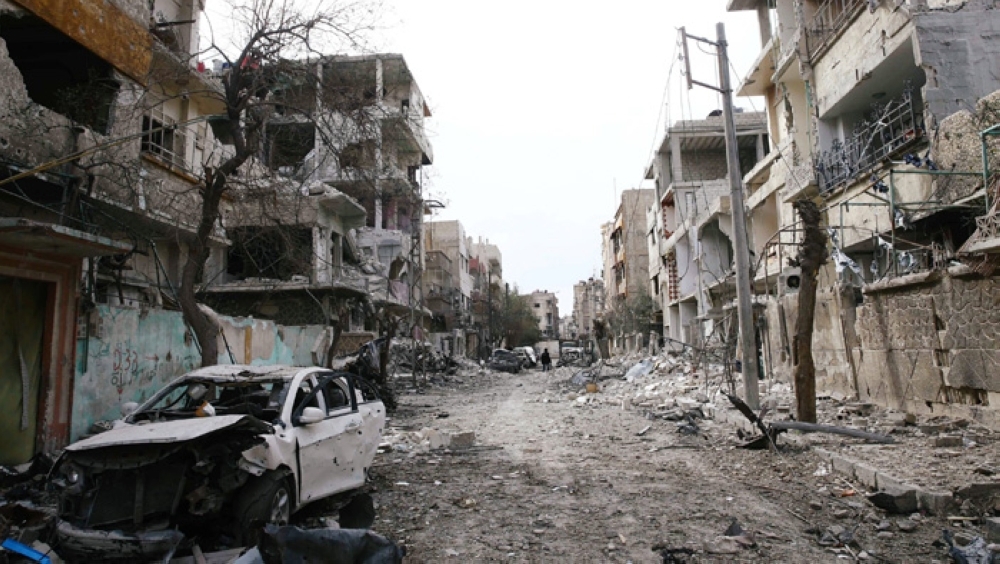BEIRUT, (Reuters) – A chemical attack on a rebel-held town in eastern Ghouta has killed dozens of people, medical services reported, and Washington said the reports – if confirmed – would demand an immediate international response.
A joint statement by the medical relief organisation Syrian American Medical Society (SAMS) and the civil defence service, which operates in rebel-held areas, said 49 people had died in the attack late on Saturday. Others put the toll at 150 or more.
The Russian-backed Syrian state denied government forces had launched any chemical attack as the reports began circulating and said the rebels were collapsing and fabricating news.
Reuters could not independently verify the reports.
The lifeless bodies of around a dozen children, women and men, some of them with foam at the mouth, were shown in one video circulated by activists. “Douma city, April 7 … there is a strong smell here,” a voice can be heard saying.

The U.S. State Department said reports of mass casualties from the attack were “horrifying” and would, if confirmed, “demand an immediate response by the international community”.
Britain’s Foreign Office also called the reports, if confirmed, “very concerning” and said “an urgent investigation is needed and the international community must respond. We call on the Assad regime and its backers, Russia and Iran, to stop the violence against innocent civilians.”
Russia, however, dismissed the reports. “We decidedly refute this information,” Major-General Yuri Yevtushenko, head of the Russian peace and reconciliation centre in Syria, was cited as saying by Interfax news service.
Syrian President Bashar al-Assad has won back control of nearly all of eastern Ghouta in a Russian-backed military campaign that began in February, leaving just Douma in rebel hands.
The Ghouta offensive has been one of the deadliest in Syria’s seven-year-long war, killing more than 1,600 civilians, according to the Syrian Observatory for Human Rights.
Facing military defeat, rebel groups in other parts of eastern Ghouta have taken safe passage to other opposition-held areas at the Turkish border. Until now, Jaish al-Islam has rejected that option, demanding it be allowed to stay in Douma.
However, Syrian state television said on Sunday Jaish al-Islam had asked for negotiations with the government. A pro-Syrian opposition TV station, Orient, said talks were underway between Jaish al-Islam and Russia to reach a final settlement for Douma.
Jaish al-Islam could not be reached for comment.
SHELTERING IN BASEMENTS
The Syrian Observatory said it could not confirm whether chemical weapons had been used in the attack on Saturday. Observatory Director Rami Abdulrahman said 11 people had died in Douma as a result of suffocation caused by heavy bombardment.
Medical relief organisation SAMS said a chlorine bomb hit Douma hospital, killing six people, and a second attack with “mixed agents”, including nerve agents, had hit a nearby building.
Basel Termanini, the U.S.-based vice president of SAMS, which operates medical facilities and supports medics in Syria, told Reuters another 35 people had been killed at a nearby apartment building, most of them women and children.
The joint statement from SAMS and the civil defence said medical centres had taken in more than 500 people suffering breathing difficulties, frothing from the mouth and smelling of chlorine.
One of the victims was dead on arrival and six died later, it said. Civil defence volunteers reported more than 42 cases of people dead at their homes showing the same symptoms, it said.
Tawfik Chamaa, a Geneva-based Syrian doctor with the Syria-focused Union of Medical Care and Relief Organizations (UOSSM), a network of Syrian doctors, said 150 people were confirmed dead and the number was growing. “The majority were civilians, women and children trapped in underground shelters,” he told Reuters.
Syrian state news agency SANA said Jaish al-Islam was making “chemical attack fabrications in an exposed and failed attempt to obstruct advances by the Syrian Arab army,” citing an official source.
U.S. State Department spokeswoman Heather Nauret recalled a 2017 sarin gas attack in northwestern Syria that the West and the United Nations blamed on Assad’s government.
“The Assad regime and its backers must be held accountable and any further attacks prevented immediately,” she said.
“The United States calls on Russia to end this unmitigated support immediately and work with the international community to prevent further, barbaric chemical weapons attacks,” Nauert said in a statement.
The Syrian government has repeatedly denied using chemical weapons during the conflict.
“We have received report of many people killed and injured in Duma in the past 24 hours. We continue be extremely concerned for people who remain in Duma who are being subjected to escalating hostilities,” UN Office for the Coordination of Humanitarian Affairs spokeswoman Linda Tom said.
Photo of damaged cars and buildings in the besieged town of Douma, Eastern Ghouta









